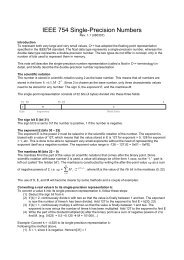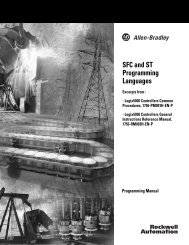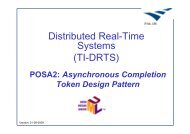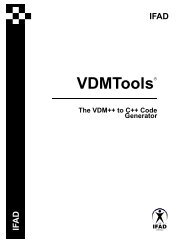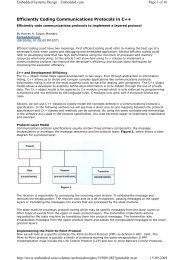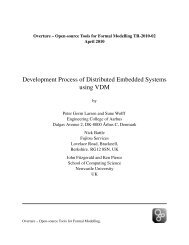- Page 1 and 2:
Overture - Open-source Tools for Fo
- Page 3 and 4:
Contents 1 Introduction 1 1.1 The V
- Page 5 and 6:
CONTENTS 13 Statements 97 13.1 Let
- Page 7 and 8:
CONTENTS A.7.19 The Undefined Expre
- Page 9 and 10:
Chapter 1 Introduction The Vienna D
- Page 11 and 12:
Chapter 2 Concrete Syntax Notation
- Page 13 and 14:
Chapter 3 Data Type Definitions As
- Page 15 and 16:
Chapter 3. Data Type Definitions We
- Page 17 and 18:
Chapter 3. Data Type Definitions Op
- Page 19 and 20:
Chapter 3. Data Type Definitions (a
- Page 21 and 22:
Chapter 3. Data Type Definitions
- Page 23 and 24:
Chapter 3. Data Type Definitions Op
- Page 25 and 26:
Chapter 3. Data Type Definitions Op
- Page 27 and 28:
Chapter 3. Data Type Definitions Op
- Page 29 and 30:
Chapter 3. Data Type Definitions m1
- Page 31 and 32:
Chapter 3. Data Type Definitions Sy
- Page 33 and 34:
Chapter 3. Data Type Definitions Th
- Page 35 and 36:
Chapter 3. Data Type Definitions
- Page 37 and 38:
Chapter 3. Data Type Definitions to
- Page 39 and 40:
Chapter 3. Data Type Definitions
- Page 41 and 42:
Chapter 4 Algorithm Definitions In
- Page 43 and 44: Chapter 5 Function Definitions In t
- Page 45 and 46: Chapter 5. Function Definitions Not
- Page 47 and 48: Chapter 5. Function Definitions Thi
- Page 49 and 50: Chapter 6 Expressions In this subse
- Page 51 and 52: Chapter 6. Expressions ✡✝ mk_Sc
- Page 53 and 54: Chapter 6. Expressions Examples: Th
- Page 55 and 56: Chapter 6. Expressions where e1 is
- Page 57 and 58: Chapter 6. Expressions all expressi
- Page 59 and 60: Chapter 6. Expressions where bd is
- Page 61 and 62: Chapter 6. Expressions 6.8 Sequence
- Page 63 and 64: Chapter 6. Expressions where all th
- Page 65 and 66: Chapter 6. Expressions mu operator.
- Page 67 and 68: Chapter 6. Expressions new expressi
- Page 69 and 70: Chapter 6. Expressions Examples: Us
- Page 71 and 72: Chapter 6. Expressions which will r
- Page 73 and 74: Chapter 6. Expressions Examples: As
- Page 75 and 76: Chapter 6. Expressions • #active(
- Page 77 and 78: Chapter 6. Expressions ✞ state si
- Page 79 and 80: Chapter 6. Expressions Semantics: A
- Page 81 and 82: Chapter 7 Patterns Syntax: pattern
- Page 83 and 84: Chapter 7. Patterns In the followin
- Page 85 and 86: Chapter 7. Patterns ✡✝ ✆ The
- Page 87 and 88: Chapter 8 Bindings Syntax: bind = s
- Page 89 and 90: Chapter 9 Value (Constant) Definiti
- Page 91 and 92: Chapter 10 Instance Variables (VDM+
- Page 93: Chapter 11 The State Definition (VD
- Page 97 and 98: Chapter 12 Operation Definitions Op
- Page 99 and 100: Chapter 12. Operation Definitions s
- Page 101 and 102: Chapter 12. Operation Definitions p
- Page 103 and 104: Chapter 12. Operation Definitions h
- Page 105 and 106: Chapter 13 Statements In this secti
- Page 107 and 108: Chapter 13. Statements ✡✝ def t
- Page 109 and 110: Chapter 13. Statements block return
- Page 111 and 112: Chapter 13. Statements Examples: Th
- Page 113 and 114: Chapter 13. Statements elseif state
- Page 115 and 116: Chapter 13. Statements ‘do’, st
- Page 117 and 118: Chapter 13. Statements 13.7 The Whi
- Page 119 and 120: Chapter 13. Statements ✡✝ (dcl
- Page 121 and 122: Chapter 13. Statements ✞ ✡✝ R
- Page 123 and 124: Chapter 13. Statements where expres
- Page 125 and 126: Chapter 13. Statements result of th
- Page 127 and 128: Chapter 13. Statements ✡✝ else
- Page 129 and 130: Chapter 13. Statements ✞ bootSequ
- Page 131 and 132: Chapter 13. Statements ✞ op1 : na
- Page 133 and 134: Chapter 14 Top-level Specification
- Page 135 and 136: Chapter 14. Top-level Specification
- Page 137 and 138: Chapter 14. Top-level Specification
- Page 139 and 140: Chapter 14. Top-level Specification
- Page 141 and 142: Chapter 14. Top-level Specification
- Page 143 and 144: Chapter 14. Top-level Specification
- Page 145 and 146:
Chapter 15 Synchronization Constrai
- Page 147 and 148:
Chapter 15. Synchronization Constra
- Page 149 and 150:
Chapter 15. Synchronization Constra
- Page 151 and 152:
Chapter 15. Synchronization Constra
- Page 153 and 154:
Chapter 16 Threads (VDM++ and VDM-R
- Page 155 and 156:
Chapter 16. Threads (VDM++ and VDM-
- Page 157 and 158:
Chapter 16. Threads (VDM++ and VDM-
- Page 159 and 160:
Chapter 17 Top-level Specification
- Page 161 and 162:
Chapter 17. Top-level Specification
- Page 163 and 164:
Chapter 17. Top-level Specification
- Page 165 and 166:
Chapter 17. Top-level Specification
- Page 167 and 168:
Chapter 17. Top-level Specification
- Page 169 and 170:
Chapter 18 Trace Definitions In ord
- Page 171 and 172:
Chapter 18. Trace Definitions stack
- Page 173 and 174:
Chapter 19 Static Semantics VDM spe
- Page 175 and 176:
Chapter 20 Scope Conflicts (VDM++ a
- Page 177 and 178:
References [Ada LRM] [Bicarregui&94
- Page 179 and 180:
Chapter 20. Scope Conflicts (VDM++
- Page 181 and 182:
Appendix A The Syntax of the VDM La
- Page 183 and 184:
Appendix A. The Syntax of the VDM L
- Page 185 and 186:
Appendix A. The Syntax of the VDM L
- Page 187 and 188:
Appendix A. The Syntax of the VDM L
- Page 189 and 190:
Appendix A. The Syntax of the VDM L
- Page 191 and 192:
Appendix A. The Syntax of the VDM L
- Page 193 and 194:
Appendix A. The Syntax of the VDM L
- Page 195 and 196:
Appendix A. The Syntax of the VDM L
- Page 197 and 198:
Appendix A. The Syntax of the VDM L
- Page 199 and 200:
Appendix A. The Syntax of the VDM L
- Page 201 and 202:
Appendix A. The Syntax of the VDM L
- Page 203 and 204:
Appendix A. The Syntax of the VDM L
- Page 205 and 206:
Appendix A. The Syntax of the VDM L
- Page 207 and 208:
Appendix B Lexical Specification B.
- Page 209 and 210:
Appendix B. Lexical Specification B
- Page 211 and 212:
Appendix B. Lexical Specification S
- Page 213 and 214:
Appendix C Operator Precedence The
- Page 215 and 216:
Appendix C. Operator Precedence eva
- Page 217 and 218:
Appendix C. Operator Precedence pre
- Page 219 and 220:
Appendix D Differences between the
- Page 221 and 222:
Index abs, 9 and, 6 card, 14 comp f
- Page 223 and 224:
INDEX arithmetic minus, 185 arithme
- Page 225 and 226:
INDEX boolean type, 6 char, 11 func
- Page 227 and 228:
INDEX sequence enumeration, 53, 187



